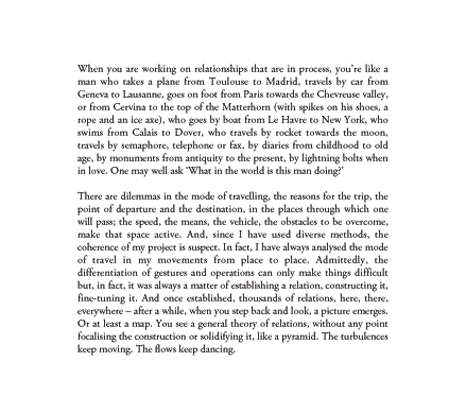
here on alimousion, winter arrives in barrels.
Posted by toby | more »on iwishicoulddescribeittoyoubetter, eyh
 Who made this? asks the naive moment.
Who made this? asks the naive moment.
My first stir of thought has been to think of making.
The idea of making is the first and most human of ideas.
“To explain” is never anything more than to describe a way of making: it is merely to remake in thought.
—- from Paul Valéry, “Man and Sea Shell,” in The Collected Works of Paul Valéry, vol. 1 (Princeton: Princeton University Press, 1956), p. 117.
Posted by 丫 | reply »a closed door that leaves us guessing
A Closed Door That Leaves Us Guessing
Pedro Costa
1. Masamichi Matsumoto is the director of Athénée Français Cultural Center, and Kazuyuki Yano is the chief of YIDFF (Yamagata International Documentary Film Festival) Tokyo Office.
First, I wanted to thank a few people –- this is going to be a bit like the Oscars, but that’s how it is. I wanted just to say thanks to my mother, to Mr. Yano and to Mr. Matsumoto, because they are the two most important people for me, at least for some time now. (1) They’ve given me a good reason for something that I’ve felt –- that perhaps I’ve loved Japan and didn’t know it. Just as in the cinema, we must meet people, real people, in flesh and blood, to believe in this love. Of course, I thank all the others in the very lovely brochure that you have published, and which gives me great pleasure and honour. All of this is to say that I thank those who I know now and didn’t know before, and that has something to do with what I’d like to say to you today, tomorrow, and the day after – simply, that we can know things through the cinema. Like me, for example, I loved Japan and I knew some things about Japan, without ever having been here before now.
I knew the Japan of films, above all of the three directors most well known in Europe –- namely, Mizoguchi, Ozu and Naruse. I knew Japan through them, these who are dead, who are of another time, but I loved it already, at a distance – and that also is very important in the cinema, to love at a distance. There were things in Japan that I’d never seen in the films of Ozu or Mizoguchi or Naruse, and that I continue not to see in Japan. Here, I launch into a rather complicated subject, for there are things that these directors, or the other great directors I don’t know, hid from me, aspects of Japan that they didn’t show me. Today I’m in Japan and I still don’t see them. That is to say, sometimes in the cinema, it’s just as important not to see, to hide, as it is to show. The cinema is perhaps more a question of concentrating our gaze, our vision of things. That’s what great directors, like these three Japanese, are doing. They are not showing Japan –- they’re condensing something. Instead of scattering your mind, your heart and your senses, they’re concentrating your vision. That’s what I’m always saying: the cinema is made for concentrating our vision. To concentrate means also to hide. It’s a cliché to say that Japan is like the films of Ozu, and the history of Japan is the same as in the historical films of Mizoguchi. Now I understand and I sense Japan better (it’s the same thing: to understand is to feel and to feel is to understand). For example (and you must not laugh now), I have the impression that I don’t see pregnant women on the streets in Japan, and I understand that after having seen the films of Ozu. I know what it means not to see a pregnant woman on the streets of Tokyo. In Ozu’s films, he gives us cues to understand that it’s hidden. That is to say, Ozu prepared me to see this absence of pregnant women. So, sometimes a director who is very much a realist, working almost in a documentary mode like Ozu, sometimes he makes films also to hide something. There’s a secret somewhere in his films, and to assert certain things he must hide others. Maybe it’s necessary to step a bit outside of Japan, because what I’m about to say could make you uncomfortable, I don’t know … but for me, the true Japanese documentaries are by Ozu. All the people I know in Japan, all my Japanese friends, I knew before, through the films of Ozu. What I’ve just said, Ozu has written in his journal. He says: ‘I’ve never made up a character. In my films, I make copies of my friends.’
Posted by lucio | reply »“the spirit of recession”
“… it was a rare moment when the course of the world seemingly revealed itself on our streets. history became available as an experience in the here and now, through the uncanny alignment of the local and the national, both of which expressed this new course in a negative light – that is to say, as the experience of the way we are being impotently dragged along in its wake, regardless of our own will and power of resistance. that feeling of forces over our head, pushing the course of the world onward like blind and unavoidable fate, would not feel so blind and unavoidable if not for the fact that these forces expressed themselves through us. they speak in attitudes and forms of thinking that compel from within an elective affinity that not only accepts these forces as right but more acutely as natural to the ways of the world.
..
in the interest of self-interest i had to understand the ways in which the social conditions were shifting, either to get in or out of their way. yet the more i understood those conditions, the more i felt like i was being conditioned by them, so that over the course of surviving, i reproduced, rather than resisting, the impulses that were aligned with the forces throwing an entire epoch into a state of petrified unrest.
but what are you supposed to do?
self-preservation is the only game, in any town. because even if you don’t play, it doesn’t mean you can’t get played. the urge to join the game is strong, and not necessarily because everybody wants to win, but because nobody has the luxury of losing.
..
the speculative form of revelation that unveils the seemingly inevitable course and consequence of a society progressing over time by virtue of an unending conflict that pits itself against its own best, which is to say human interest, has an illustrious name in the history of ideas. it is called spirit.
..
a recession is more than an economic and social phenomenon that must be endured. it holds within itself a kern of unreason that promises to release it from the constraints of rationality so that new possibilities can come about in its use and meaning. that unreason is its religiosity. for the other definition of recession has to do with the church. namely, the time after church service, when the clergy departs and the people who make up the congregation are left to themselves. as the church authorities leave a hymn is sang. that is called the recessional. and it is here in the act of leaving and singing that the idea of a recession gains its transformative potential–for a church without authority is blessed indeed. the end of the service announces the beginning of another kind of time. no more commands for sacrifice and expression of faith, no more sermons from the book of progress, no more exchange of prayers. time holds no more duties and returns to the people a sense of being neither guaranteed nor determined; an inner composition unburdened by the anxiety of influence, and which finds its own shape only when power recedes. this is the time when thoughts turn away from authority that captures their attention, from above and from within, and towards the radical demands of life after church. the recessional marks the moment of this turning. it is the emphatic image of time shaped by the invisible currents of something both passing and coming. it acts like a lyrical farewell and charges the entire space with the anticipation of new tidings that only real endings can bring.
..
the spirit is a bone, the philosopher hegel once declared. to find the courage to say the very last words and to make them sing like the recessional to the very last service – this is what i call art. and then to master the strength to stay on firm, not leave and endure through spirit – this is what i call the creative act today.”
paul chan, the spirit of recession, public art fund speech originally recorded by WPS1, New York, April 2008
you can listen to the whole speech here. please do.
Posted by f | more »a picture emerges

serres & latour, conversations on science, culture and time
Posted by toby | reply »